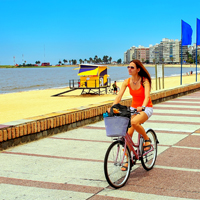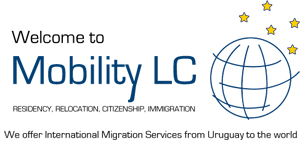Pros and Cons of Living in Uruguay
Last updated on Mar 01, 2024
Summary: The pros of living in Uruguay include its low cost of living, its high quality of life, its strong economy, its excellent healthcare system, its beautiful beaches, and its vibrant culture. The cons of living in Uruguay include its limited job opportunities, its high taxes, its lack of public transportation, its limited access to international flights, and its limited access to international goods and services.
What are the pros and cons of living in Uruguay?
Expats, digital nomads and retirees living in Uruguay responded:
"The weather is perfect and it is only 3.5 million people in the whole country which is good. There are plenty of opportunities for everyone. Very little pollution and people are educated and polied," explained one expat living in Montevideo.
"Expats and digital nomads in Uruguay appreciate the country's low cost of living, its relaxed lifestyle, and its friendly people. They also enjoy the country's stunning natural beauty, its vibrant culture, and its excellent infrastructure. On the downside, expats and digital nomads may find the language barrier challenging, as Spanish is the primary language spoken in Uruguay. Additionally, the country's bureaucracy can be difficult to navigate, and the lack of job opportunities can be a challenge for those looking to stay long-term," said one expat in living in Uruguay.
 Mobility LC
Mobility LCConnect
Mobility LC is committed to work hard to make your Uruguayan immigration and relocation process a reality. We can provide you with the best local contacts and will guide you all the way through the process offering support in 5 different languages. Your success is our personal goal.
Click connect to have our partner contact you via e-mail and/or phone.
 Mobility LC
Mobility LCMobility LC is committed to work hard to make your Uruguayan immigration and relocation process a reality. We can provide you with the best local contacts and will guide you all the way through the process offering support in 5 different languages. Your success is our personal goal.
Connect
Click connect to have our partner contact you via e-mail and/or phone.
What do expats in Uruguay appreciate most about the local culture?
"The lack of the fedral gummint's nose in my business. The fact that people here are more laid back & easygoing in their approach to life. The fact that there are no "old folks' homes" here. Old folks stay with the family until they die - they don't get farmed out for someone else to take care of because the family can't be bothered..," said one expat in Punta del Diablo.
"Expats in Uruguay appreciate the laid-back lifestyle and the friendly people. They also enjoy the country's natural beauty, with its stunning beaches, rolling hills, and lush forests. The country's vibrant culture, with its unique music, art, and cuisine, is also a draw for many expats. Additionally, Uruguayans are known for their strong sense of community and hospitality, which makes it easy for expats to feel at home," said a person living in Uruguay.

Mobility LC is committed to work hard to make your Uruguayan immigration and relocation process a reality. We can provide you with the best local contacts and will guide you all the way through the process offering support in 5 different languages. Your success is our personal goal.
Click connect to have our partner contact you via e-mail and/or phone.

Mobility LC is committed to work hard to make your Uruguayan immigration and relocation process a reality. We can provide you with the best local contacts and will guide you all the way through the process offering support in 5 different languages. Your success is our personal goal.
Click connect to have our partner contact you via e-mail and/or phone.
What do expats find most challenging?
"Expats in Uruguay often find the language barrier to be the most challenging aspect of the local culture. Many locals speak Spanish, and those who don't speak English may be difficult to communicate with. Additionally, the slower pace of life in Uruguay can be difficult for expats to adjust to, as it is much slower than what they may be used to in their home countries. Furthermore, the cultural norms and expectations in Uruguay can be difficult to understand for expats, as they may be different from what they are accustomed to," remarked one expat in Uruguay.
"Because of 3 previous head injuries, I struggle with remembering precise wording & phrasing of Spanish, especially now when faced with formal Castillano... But people are so patient & understanding, even if you arrive speaking Mexican Spanish, they still understand you, as most of their TV is in Mexican Spanish..," explained one expat living in Punta del Diablo.
About the Author
 Joshua Wood, LPC joined Expat Exchange in 2000 and serves as one of its Co-Presidents. He is also one of the Founders of Digital Nomad Exchange. Prior to Expat Exchange, Joshua worked for NBC Cable (MSNBC and CNBC
Primetime). Joshua has a BA from Syracuse and a Master's in Clinical and Counseling Psychology from Fairleigh Dickinson University. Mr. Wood is also a licensed counselor and psychotherapist.
Joshua Wood, LPC joined Expat Exchange in 2000 and serves as one of its Co-Presidents. He is also one of the Founders of Digital Nomad Exchange. Prior to Expat Exchange, Joshua worked for NBC Cable (MSNBC and CNBC
Primetime). Joshua has a BA from Syracuse and a Master's in Clinical and Counseling Psychology from Fairleigh Dickinson University. Mr. Wood is also a licensed counselor and psychotherapist.
Some of Joshua's articles include Pros and Cons of Living in Portugal, 10 Best Places to Live in Ireland and Pros and Cons of Living in Uruguay. Connect with Joshua on LinkedIn.
Other Questions:
- How do I meet people in Uruguay?
- What is life like as an expat in your area?
- Is there a lot of crime in Uruguay?
- What do I need to know before retiring in Uruguay?
- Is there a lot of diversity? Are people in Uruguay accepting of differences?
- What are the schools in Uruguay like?
- Is the cost of living in Uruguay high?
- What advice do you have for expats having a baby in Uruguay?
- What are healthcare services like in Uruguay?
- Is the cost of living in Uruguay high?
- What type of recreational facilities are in Uruguay?
- What is the weather like in Uruguay?
- Are there good restaurants in Uruguay?
- Where will I buy groceries and do other shopping in Uruguay?
- What are the visa & residency requirements in Uruguay?
- Are healthcare and health insurance expensive in Uruguay?
- What do I need to know when buying property in Uruguay?
- Are foreigners allowed to own property in Uruguay?
- What appliances are typically included in a rental?



